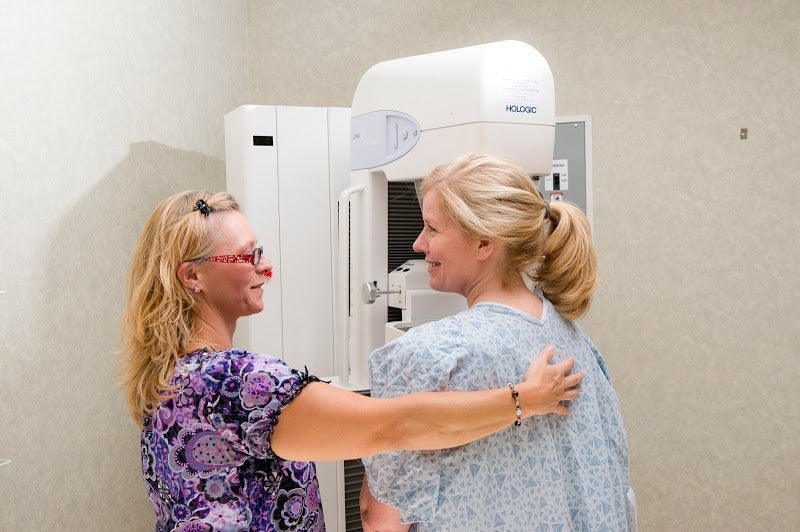MRI
At Garnet Health, we offer Magnetic Resonance Imaging (MRI) services in Middletown and Harris, NY.
Location Search Access Test Results in MyChartBody
Magnetic Resonance Imaging (MRI)
Magnetic Resonance Imaging (MRI), is an advanced, state-of-the-art method which produces very clear pictures, or images, of the human body utilizing a large magnet and radio waves. There is no radiation produced during the exam - unlike X-ray and CT scans.
With MRI, a physician can see what is wrong in many parts of the body, including the head, neck, spine, abdomen, pelvis, joints, prostate, blood vessels and musculoskeletal regions of the body. These imaging services can provide:
- Early cancer diagnosis, which increases survival rates
- Accurate evaluation of lower back pain
- Conclusive diagnosis of headache and dizziness symptoms
Garnet Health offers patients, on an inpatient and outpatient basis, MRI scans utilizing our Wide Bore, 1.5 Tesla, Magnetic Resonance Imaging (MRI) systems. This technology combines a larger bore, or opening, and can capture top-quality diagnostic images. The strength of a magnet is measured in units of Tesla. Our Wide Bore MRI system has a high Tesla magnet, meaning that images produced will be superior to those of a lower Tesla magnet.
Aside from the improved imaging of the MRI machine, the essential benefit to patients using our Wide MRI machine is that in comparison to traditional MRI machines, "wide bore" has a larger opening, making it easier for patients who are obese or claustrophobic to have a MRI scan.
Receiving Test Results
Once images are taken, they are immediately available for review by your doctor through our secure Web viewer. Test results are delivered electronically via our GE IntegradWeb Picture Archive Computer System (PACS) to aid in fast diagnosis. To request a copy of your diagnostic imaging exam, call us at: 845-333-1222
You may also login to your MyChart account to view your results.
The human body is made up of millions of atoms, which are magnetic. When placed in a magnetic field, these atoms line up with the field, much in the way a compass points to the North Pole.
Radiowaves, tuned to a specific frequency, tip these tiny magnets away from the magnetic field. As they tip, they gain energy. When the radiowaves are turned off, the atoms try to realign with the magnetic field, releasing the energy they gained as very weak radio signals. A powerful antenna picks up these signals and sends them to the computer, which performs millions of calculations to produce an image for diagnosis.
The combination of radiowaves and magnetic field produce detailed images of body structures such as the brain, the spine and other vital organs. This technology enables physicians to detect developing diseases or abnormalities and better understand the pathology of a patient's condition. Utilizing the findings of your MRI scan, your physician will better understand the pathology of your condition which allow them to tailor your treatment plan to you.
The MRI exam poses no risks to the average patient if appropriate safety guidelines are followed. If you have any questions regarding the MRI exam, please be sure to discuss them with your doctor.
There are three main categories of MRI exams that we conduct at Garnet Health and that includes:
Neuro Imaging
MRI's are one of the most commonly performed exams in neurology, offering high quality diagnostic imaging of the brain and spine - which may include the patients' pituitary glands, spinal column, eyes, discs, orbits, face, internal auditory, or soft tissues in the neck. Your doctor may order neuro imaging to help diagnose or determine the extent of a variety of conditions or symptoms, such as:
- Tumors
- Infractions
- Edema, or swelling
- Hemorrhaging
- Spinal cord abnormalities
- identify multiple sclerosis
- Pituitary abnormalities
- Structural abnormalities that could be causing common symptoms such as hearing loss, dizziness, headaches or visual changes
Abdominal and Pelvis MRI
Your doctor may request an abdominal MRI or pelvis MRI to examine a variety of organs, soft tissues, bone and other internal body structures, such as:
- Liver
- Kidneys
- Pancreas
- Magnetic resonance cholangiopancreatography (MRCP), a technique for viewing the bile ducts and the pancreatic duct
- Gallbladder
- Female and male anatomy including the uterus, ovaries and fallopian tubes, or prostate and seminal vesicles.
- Rectum and anal area
Musculoskeletal MRI
MRI's are also commonly used for medical evaluation of the musculoskeletal system for orthopedic conditions of the knee, shoulder, ankle, wrist and elbow. Provided images from this MRI allow physicians to examine major joints and soft tissues including muscles, tendons and ligaments. Some common conditions that are diagnosed through a musculoskeletal MRI are:
- Degenerative arthritis
- Tears of ligaments and tendons
- Fractures
- Sports-related injuries
At Garnet Health, our MRI technologists and radiologists tailor protocol based on your individual diagnosis and the conditions provided by your physician to acquire the necessary images for the best patient outcomes.
Prior to your exam, please review the following:
Previous Diagnostic Exam Results
Please bring previous X-rays applicable to the exam. The radiologist may want to review them. (For example: If you are having a MRI of the knee, bring any previous X-rays of your knee.)
Claustrophobic Patients
The wide-bore MRI machines at our Garnet Health locations are great for claustrophobic patients. The machine is open on both ends and have a larger opening than traditional MRI machines. The opening is nearly 2.3 feet (or 70 cm) in diameter with approximately one foot of free space between a patient's head and the magnet.
If you are concerned about feeling claustrophobic during your exam, ask your doctor to prescribe medication prior to the exam. If you do receive medication, please bring someone with you who will be able to drive you home because you will not be able to drive yourself.
Eating or Drinking Prior to Your MRI Exam
For most MRI scans, you can eat and drink prior to the exam. We urge you to check with your provider regarding preparations needed for your exam, as some do require fasting prior to the exam.
Implantable Devices and MRI's
If you have an implantable device, you may not be able to get an MRI exam. Certain cardiac pacemakers, neurostimulation systems, and medication pumps are compatible or have specific specifications for MRI exams. These specifications are based on the type of implantable device you have, such as:
- Cerebral aneurysm clips
- Certain heart valves
- Cochlear implants
- Pacemaker
Our MRI technologists and radiologists must know the exact type of device you have in order to follow the special procedures to ensure your safety. Please bring the information card or pamphlet that accompanied your implantable device for our technicians to analyze. If you do not have or cannot locate your card/pamphlet, please contact your surgeon or physician and have them fax the information to our team.
Items to be Removed Prior to MRI exam
As an MRI scan is a strong magnetic environment, we require the following items to be removed prior to entering the MR system room:
- Purse and/or wallet
- Money clip
- Credit cards, or cards with magnetic strips
- Electronic devices and cell phones
- Hearing aids
- Metal jewelry and watches
- Pens
- Paper clips and safety pins
- Keys
- Coins
- Hairpins
- Shoes
- Belt buckles
Although MRI is a very advanced medical technique, the MRI exam is probably one of the easiest and most comfortable exams you may ever experience.
The technologist will simply ask you to lie down on a cushioned table which will automatically move into the magnet after you have been comfortably positioned for scanning. The technologist will leave the magnet room, but you will be in constant contact with each other through the entire exam.
When the MRI scan begins, you will hear a muffled thumping sound which will last for several minutes. Many patients find the machine to be very noisy, so we often offer our patients ear plugs or protective wear or even headphones to wear during the exam.
Other than sound, you should experience no other sensation during scanning. It is important for you to remain very still during the examination, as any movement could cause distortion and affect the image quality of the scan. In many cases, your technologist will re-attempt images that have been distorted by movement which will increase the length of your exam.
Length of Scan
The total length of your scan will vary. The average test is 20 minutes long, but many last as long as 45-50 minutes per exam. Please note: you may have a script for multiple MRI scans; for example, you may be receiving both an abdominal and brain exam.
When scanning is completed, the technologist will return to assist you off the table.
Additional Resources
Locations
Ray W. Moody, M.D. Breast Center at Garnet Health Medical Center
707 East Main Street
Middletown, NY 10940
Garnet Health Medical Center - Catskills, Harris Campus
68 Harris Bushville Road
Harris, NY 12742


